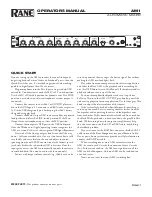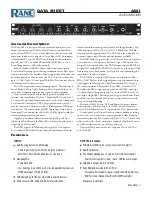
88D User Manual
13
Pressing the
EQ
key will show the Frequency and Level for the first 4 bands. Press
the PAGE 2 key to show Q and Shape. If there are more than 4 bands present, then
bands 5-8 are selected using the FLTR / SCF / KEY key.
The
FLTR SCF/KEY
key shows Filter parameters, and Sidechain Filter or Key Input
controls on pressing the PAGE 2 key.
Each press of the
I/O & PAN
key will toggle through available Inputs and Outputs.
The first page shows current port input (or output), trim, phase and delay. Press
PAGE 2 to show port, trim and phase, plus the four pan controls. If there is more than
one output assigned to a path, the key becomes a three-state toggle. If ABW has
been assigned, this is also shown on this page.
Pressing the
COMP/LIM
key will show compressor controls. Limiter controls are
selected with the PAGE 2 key.
Pressing the
GATE/EXP
key will show gate controls. Expander controls are selected
with the PAGE 2 key.
Pressing the
INS
key will show insert ports plus trim and delay. It is possible to add
trim and/or delay to both the input and output ports. The PAGE 2 key only has a
function if there is a second insert.
The
Aux 1-8
key is used to show levels and on/off for auxes 1-4. Press the
GAIN/BAL key to access Pre/Post and Pan (if stereo). Press the PAGE 2 key (and
GAIN/BAL) to show controls for Auxes 5-8.
The
Aux 9-16
key is used to show levels and on/off for auxes 9-16. Press the
GAIN/BAL key to display Pre/Post and Pan (if stereo). Press the PAGE 2 key (and
GAIN/BAL) to show controls for Auxes 13-16.
The alpha window shows the currently selected process. As a logicator is touched,
this display will change to show which control is active. The value of that control will
be shown in the alpha window adjacent to the logicator itself. Pressing the
ON/CLEAR
key turns on or off the currently displayed process. The internal LED will
be green if the process is present, red if it is switched on.
Summary of Contents for 88D
Page 1: ...88D User Manual 1 ...
Page 8: ...88D User Manual 8 3 Console Surface ...
Page 46: ...88D User Manual 46 ...














































